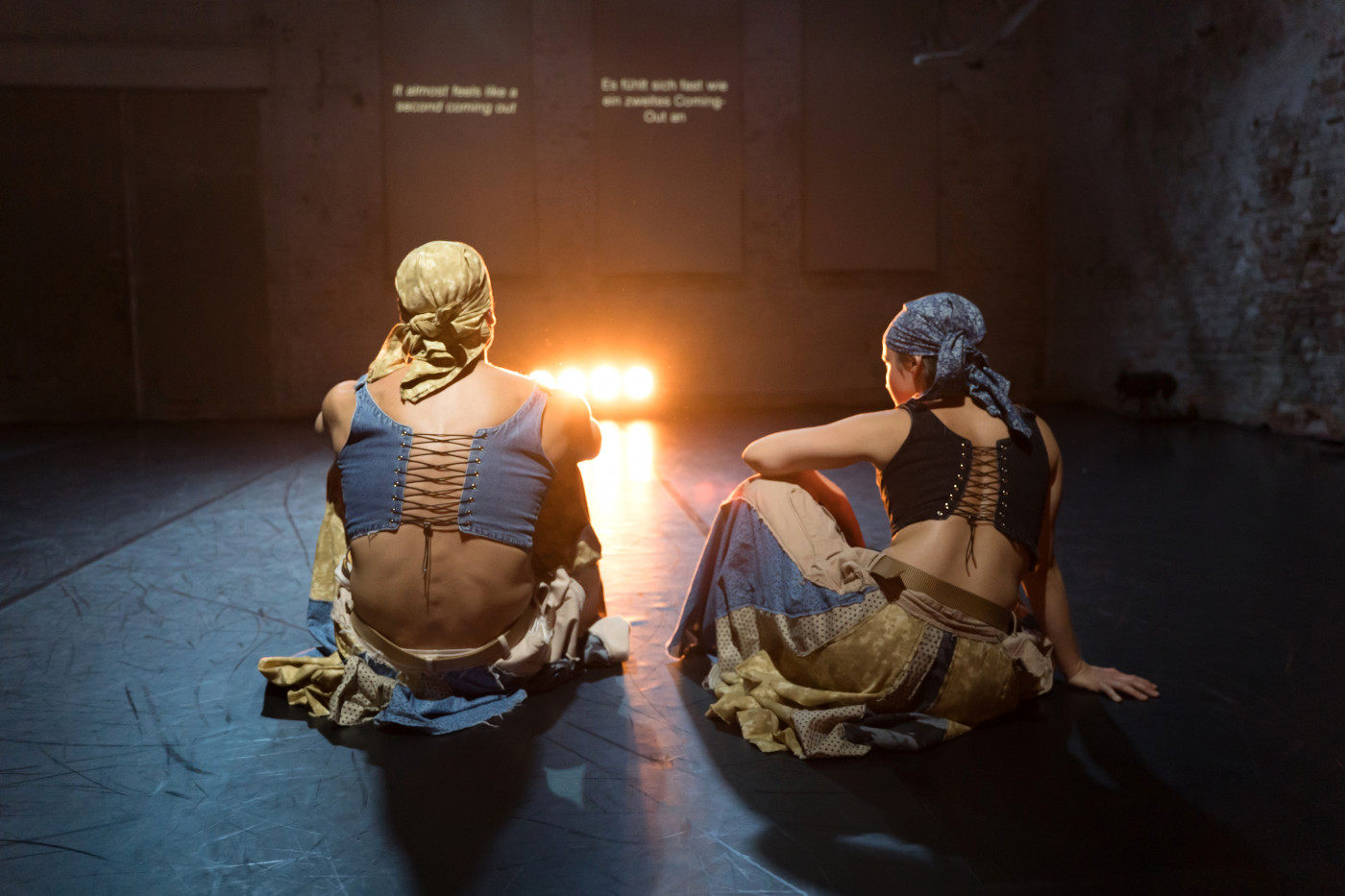
Elegy for a Landscape
In April 1525, an unusually large silk cloth hung in the Church of St. Mary in Mühlhausen, Thuringia: 35 meters high, a rainbow on a white background, beneath it the Latin words „verbum domini maneat in aeternum“ („The word of the Lord remains forever”) and „dis ist das zeychen des ewigen bund gotes“ („This is the sign of God’s eternal covenant with humankind“). The initiative came from Thomas Müntzer, pastor of the church and leader of the Thuringian Peasants’ Revolt, which ended in disaster in the Battle of Frankenhausen a month later. The rainbow itself – already mentioned in the Old Testament of the Bible – became the symbol of the peasants’ uprising, which Friedrich Engels later called the „the German people’s greatest attempt at revolution“ – an attempt that was brutally crushed.
Today, the rainbow flag – once famous as Italy’s pacifist pace flag – carries a different, but no less political meaning: it has become the worldwide symbol of the queer movement, standing for diversity, visibility, and legal equality – for the claim to challenge existing power relations and demand social change. And it remains a contested symbol to this day.
Choreographer and dancer Hannah Schillinger takes up this lesser-known symbolic history in her piece Field Work. Together with her co-performer Aaron Lang, she moves through the four seasons, which here do not appear as mere images of nature, but as a dramaturgical frame, pointing to the eternal cycle of work and rest, sowing and harvesting. History here does not appear as linear progress but as recurrence. The field becomes a space of resonance, where tradition and the present, body and technology overlap: materialized as flail and drone, manual labor and algorithm.
The cycle begins in winter. Bodies bend, arms swing out as if drawing invisible furrows. Movements from pre-industrial agriculture return – heavy, archaic, yet intertwined with courtly gestures reminiscent of circle dances. Work and dance, toil and festivity flow into one another.
In spring, the fields are raked, sown, and fertilized. Cowbells ring in the distance, while wooden tools like tridents and flails come into use – both of which have also long served as weapons. The trident in particular is a mythological and religious attribute of violent power: not only Neptune but also the devil carries it. The flail, meanwhile, refers not only to peasant labor but – derived from flagellum – also to self-flagellation, a penitential practice disciplining, purifying, and cleansing the body.
On stage, these objects oscillate between nostalgia and fetish, between folklore and sadomasochism. Life-sustaining work appears at the same time as self-punishment, agriculture as a ritual of pain and pleasure – the field as a wounded landscape, shaped by human history and its drive for progress, by labor, by desire. All these meanings resonate in the staging: the tools appear both as nostalgic folklore objects and as symbols of discipline, bodily labor, and its rituals.
Autumn brings the harvest – and an exuberant, almost Dionysian dance of joy. Yet the ecstasy tips over: tools turn into prostheses, the human body merges with machine fantasies. Finally, the tools freeze into sculptures, no longer being used but only viewed as artifacts of a progress-believing culture that turns itself into a museum. At the end, a drone flies over the field. Ethereal, transfigured music sounds, almost kitschy, perhaps as an ironic counterpoint to the martial character of the drone – at once a messenger of digitized technology and an envoy of present-day wars.
Indeed, Field Work is permeated by a dual, ambiguous gaze: on manual work, the body’s closeness to the soil, and on the machines that replace or estrange this work. The field becomes a stage where history appears in repetitions and shifts – a space where peasant traditions and digital presences collide.
Like me, Hannah Schillinger grew up in the countryside (though in a very different region) – yet I find my own perspective far less nostalgic or folkloristic than the one prevailing in her piece. My memories are not shaped by peasant manual labor but by images of thoroughly industrialized agriculture: gigantic machines, monocultures, automated processes, fertilizers and pesticides whose effects are both known and unknown. I remember the driver in the combine harvester, enclosed in a glass cabin, manual work reduced to the movement of a joystick. The connection between body and soil seems severed, replaced by machine control, estrangement, and isolation. Helicopters circle above treetops, spreading lime so that forests receive nutrients no longer produced by the sick ecosystem itself. Nature thus becomes a cycle that no longer sustains itself but must be artificially kept alive from the outside.
Against this backdrop, Field Work seems almost like an elegiac, lamenting counterpoint: by reconstructing gestures of peasant labor and at points confronting it with contemporary technology, it recalls a kinship between body and nature that has largely been lost in industrial agriculture – without wanting to idealize the past. And yet a kind of mourning prevails: the piece shows how labor, ritual, and technology interlock, how tools become fetishes and machines turn into sculptures. The result is an image of a self-enclosed field of tension, neither pure nostalgia nor technophobic critique, nor blind faith in technological progress – but rather remains a tentative movement between both poles.
Precisely here, Hannah Schillinger’s reference to „solarpunk“ could open up a perspective: toward an aesthetic and political stance that imagines an ecological future where technological progress is harnessed sustainably and regeneratively – offering a vision that transcends crisis rhetoric and future anxieties. Field Work would thus dwell less in the past and instead open the view toward possible futures: toward an agriculture that does not separate body and technology nor merely fantasizes their harmony, but intertwines them anew; toward a life with inner and outer nature that is neither romanticized nor instrumentalized, but continually renegotiated.
Jette Büchsenschütz, Berlin, 20/08/2025
